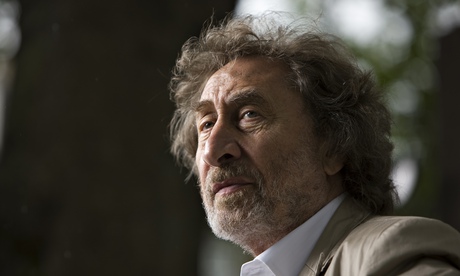
Arriving amid war in Gaza and a wave of antisemitic incidents across Europe, Howard Jacobson's new novel portrays a sinister UK-like state several decades hence, after a pogrom of 200,000 Jews a few years from now – an event known as "what happened, if it happened". The effort to wipe the massacre from memory forms the backdrop to a love story between two outsiders in a remote seaside village: Kevern, a perplexed woodturner in his 40s, and Ailinn, a younger woman abandoned as a baby. What neither knows is that the force uniting them is stronger than mere attraction – state agents are watching to ensure they get together.
Coming from a writer who has railed against genre fiction, J looks like a U-turn. The real surprise is how much better it is than Jacobson's recent novels, Zoo Time (2012) and The Finkler Question (2010). Although J's narrator tells us on page 13 that jazz has fallen into "desuetude, like the word desuetude", there aren't many of the unfunny gags that crippled the earlier books, as Jacobson quarantines his worst impulses (putting on a Chinese accent) in the diary of an art lecturer compiling a Stasi-like report on Kevern.
The diary gives Jacobson something to lean on as he sets about informing us how the world of J works, but mostly he embeds vignettes of "what happened" in dramatic exchanges that earn their keep beyond expository value. One scene shows Ailinn's grandmother Rebecca as a schoolgirl in bed with her teacher, whose attempted seduction wilts after he confesses he let a mob burn down a building in which he knew his Jewish lover's nine-year-old daughter to be present.
The nested narrative stokes our curiosity by cutting between time frames with continual insertions of mysterious accounts of historical violence. The novel's success owes much to the fine texture of its dystopia. After "what happened", all citizens were given new surnames to eliminate "invidious distinctions between the doers and the done-to". Hinchcliffe became Behrens; Scannláin, Kroplik; and so on, in an initiative known as Operation Ishmael (because of the line in Moby-Dick, "Call me Ishmael", a gag Jacobson can't quite resist). The role of social media in the massacres means that mobile phones are now a thing of the past; Ailinn recalls reading, as a girl, "comics about a time when people wrote to one another by phone but wrote such horrid things that the practice had to be discouraged".
The book's title isn't actually J, but a special character – the letter struck through twice – that is pronounced in the novel with two fingers over the lips for fear of who might be listening. Nowhere do "Jews" appear in the text; only an unspecifically specific "they". Apologists for the massacre invoke "the countries they laid waste [with] their egoistic policy of 'never again'"; deniers say that "to win another of their propaganda wars they did what they had done for centuries and put on another of their pantomimes of persecution".
As a conspiracy yarn examining the manipulation of collective memory, J has legs, and it's well worth its place on this year's Man Booker longlist. But how troubled you are by it will depend on how serious you want to get; Jacobson, known as a comic novelist, isn't joking this time, or not much anyway. An aside about boiling frog syndrome suggests that he wants J to be read as an alarm call to British Jews sleepwalking to their doom. He favours mystification over analysis when it comes to offering explanations for "what happened" – a sensible choice that nonetheless risks sounding histrionic when we're required to accept that Jewish people incite an immutable bloodlust. Rebecca's teacher attributes his inaction not only to herd mentality but to "something ancient… It's you or them. You can't both breathe the same air".
How other minorities fit into this picture is a question J anticipates. Much weight falls on a speech citing the narcissism of small differences as a primary factor in the intensity of hatred prior to "what happened". During a road trip to "the capital" – a ghost town populated by "idly perambulating gold-ringed men in keffiyehs" – it's implied that liberal concerns about Palestine or Islamophobia served as a trojan horse for mass murder: "We said we were acting in their interest when all along we were acting in our own. The truth is we didn't give a fig about their misery or dispossession."
Many readers will have made up their minds about the issues in J before they open the book. But the fact that Jacobson has crafted an immersive, complex experience with care and guile means the novel won't have to stand or fall only on its merit as argument.

